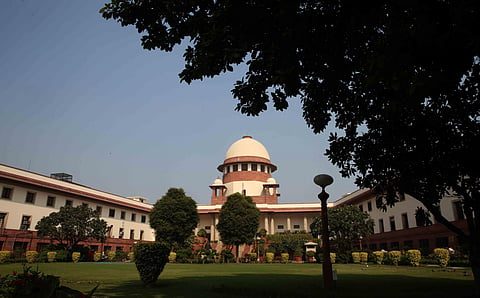

NEW DELHI: Its survival at stake, Vodafone Idea on Monday told an irate Supreme Court bench that it will not be able to provide any bank guarantees against its AGR liabilities. These pending dues, penalties and interest in penalties run to over Rs 51,000 crore even after accounting for the Rs 7,854 crore the company has paid so far.
The submission came at the SC's hearing on Adjusted Gross Revenue (AGR) dues, where the apex court is considering whether to grant the government's plea to allow telecom companies to pay their remaining dues in installments over 20 years.
While the Supreme Court bench reserved its judgement on the payment schedule on Monday, it directed that there would be no further re-assessment or recalculation of dues. It also ordered insolvent companies that have AGR liabilities -- such as Aircel, Reliance Communication, Videocon, etc -- to submit their insolvency documents.
The next hearing in the crucial case has been scheduled for August 10.
Vodafone in deep trouble
During Monday's hearing, Vodafone's counsel Mukul Rohatgi told the bench comprising Justices Arun Mishra, S Abdul Nazeer and MR Shah that no lender was willing to provide the company a guarantee.
"All tangible assets are secured before banks, no nationalised bank is willing to give a guarantee," Rohatgi told the bench. He also added that "over the past 15 years, the entire net worth of the company has been wiped out", with all the income spent on liabilities, taxes, and statutory dues.
Equity worth Rs 1 lakh crore brought by the promoters over this period has been eroded, he said, when the SC raised queries on how it could trust that Vodafone Idea would pay the rest of its dues if granted a longer timeframe.
The company, however, pointed out that it was due an "undisputed" GST credit of Rs 8,200 crore, which may be retained by the government as security. Vodafone Idea also told the bench that it had not made contingent provisions for the AGR liability because the TDSAT had ruled in favour of the telcos.
The company added that its actual outstanding dues in terms of principal were only around Rs 14,000 crore and that the rest was made up of penalties and interest.
Decision on payment schedule crucial
The Adjusted Gross Revenue (AGR) case has been a millstone around the neck of the telecom industry for over three quarters now. On October 24, 2019, the same Supreme Court bench had delivered a massive blow to incumbent telecom players in the legal dispute, which began over 14 years ago. The court ruled that AGR should include 'revenues from non-telecom businesses of the license-holders'.
Since AGR is the basis on which statutory levies like Spectrum Usage Charges (SUC) and License Fees (LF) are charged, over a dozen telecom firms -- both operational and defunct -- were ordered to pay up fourteen years worth of pending dues, penalties and interest.
New entrant Reliance Jio, a market player only since 2016, promptly paid its dues of Rs 193-odd crore before the January 23, 2020 deadline set by the court. But, the story has been different for those who had been operating longer.
Three companies have borne the brunt of the verdict -- Vodafone Idea, Bharti Airtel and the Tata group (Tata Telecomunications) -- and now face tax dues of over Rs 58,254 crore, Rs 43,890 crore and Rs 16,798 crore respectively.
While Bharti Airtel has been able to pay up Rs 18,004 crore already through a couple of fundraising measures, Vodafone Idea has had a far difficult time. The company and its promoters have warned several times already that if it were directed to meet its full liabilities in one go, it would likely head toward insolvency.
Government sources have confirmed that the prospect of a private sector telecom duopoly in Reliance Jio and Bharti Airtel will be undesirable. And Vodafone Idea, despite its hemoharraging customers over the past few months, still has a subscriber base of over 290 million.
The company has only managed to pay Rs 7,854 crore so far. Out of this amount, Rs 1,000 crore was paid just this Saturday.
With industry representatives crying hoarse on the damage a full and immediate payout would do, the DoT decided in March to seek the SC's blessing to provide relief. The telecom firms, it petitioned, should be allowed to pay their dues in instalments spread over 20 years.
On Monday, Solicitor General Tushar Mehta told the SC bench that the Union Cabinet had decided to petition for a 20-year staggered payment schedule "to save the economy from its cascading effect".
Tough road ahead
Even if relief is granted, analysts say, the road to recovery is unlikely to be easy.
Vodafone Idea especially is facing a massive tariff hike across segments in order to meet its cash flow requirements -- even after factoring in AGR payouts over 20 years.
In a report published after the last hearing, analysts from Motilal Oswal had noted that a 20-year payment period at 8 per cent interest would result in a cash outgo of Rs 2,700 crore per annum for Bharti Airtel and Rs 5,200 crore for Vodafone Idea.
"Considering Vodafone Idea's liquidity constraints, it needs a ~50 per cent ARPU (average revenue per user) increase to achieve EBITDA of Rs 30,000 crore by FY22E," they wrote.
Such a tariff hike would bridge the gap between the estimated Rs 12,800 crore EBITDA in FY22 against a cash requirement of: Rs 16,500 crore in deferred spectrum liabilities; Rs 5,200 crore in annual AGR payments; Rs 3,000 crore in cash interest cost to lenders; and capital expenditure of Rs 5,200 crore.
"This is assuming there is no further subscriber churn, which also seems unlikely given the weak network capability and negative consumer sentiment," Motilal Oswal had warned.
ALSO SEE: